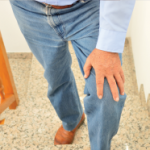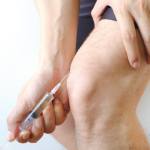 EULAR 2022 (VIRTUAL)—Haibel et al. compared the use of intra-articular morphine and intra-articular triamcinolone with intra-articular placebo (saline) to determine their effectiveness for pain reduction in adults with chronic knee arthritis. During the 2022 Congress of the European Alliance of Associations for Rheumatology (EULAR), June 1–4, Copenhagen, Denmark, Hildren Haibel, MD, a rheumatologist in the Department of Rheumatology at Campus Benjamin Franklin at Charity-University Medicine Berlin presented the results of their research.1
EULAR 2022 (VIRTUAL)—Haibel et al. compared the use of intra-articular morphine and intra-articular triamcinolone with intra-articular placebo (saline) to determine their effectiveness for pain reduction in adults with chronic knee arthritis. During the 2022 Congress of the European Alliance of Associations for Rheumatology (EULAR), June 1–4, Copenhagen, Denmark, Hildren Haibel, MD, a rheumatologist in the Department of Rheumatology at Campus Benjamin Franklin at Charity-University Medicine Berlin presented the results of their research.1
Patients with inflammatory arthritis, such as rheumatoid arthritis (RA), and those with chronic degenerative joint diseases, such as osteoarthritis (OA), suffer from chronic pain that restricts their function and daily activities. Current intra-articular injection therapy includes the use of glucocorticoids, but this treatment approach is not without complications. Intra-articular glucocorticoids can increase the risk of infection and lead to cartilage degeneration and other systemic adverse effects, such as loss of bone density, infection, hyperglycemia and Cushing syndrome. Morphine does not have the same adverse effects as glucocorticoids, so the use of intra-articular morphine to manage chronic joint pain is a novel approach.
The goal of this placebo-controlled and active drug clinical trial was to evaluate pain reduction in patients with chronic knee arthritis after an intra-articular injection of either morphine, triamcinolone or placebo. The researchers hypothesized that intra-articular morphine would result in significantly lower pain scores than placebo. The study’s primary outcome parameter was a reduction in the Visual Analog Scale (VAS) pain score at day 7.
The study included adults with a high level of pain—a VAS pain score of at least 4 out of 10—at baseline and inflammatory arthritis, including RA, psoriatic arthritis, spondyloarthritis, oligoarthritis or monarthritis, or chronic knee arthritis due to OA. Participants were randomized to receive a single, intra-articular dose of 3 mg of morphine, 40 mg of triamcinolone or placebo. Throughout the study, patients were closely monitored and documented their pain in a diary in the mornings and evenings. Safety data were collected throughout the study, and P-values were calculated using two-sided T-tests.
The Results
One-hundred and fourteen patients were screened; 93 patients received treatment, and 89 patients (96%) completed the seven-day study. Sixty-one patients (66%) had been diagnosed with OA, and 32 patients (34%) with inflammatory arthritis. Additionally, 52% of patients (n=48) were women, with a mean age of 58.5 years (standard deviation: 14 years) and a mean duration of disease of 6.7 years. At day seven, the VAS pain improvement means were -22.8 for the morphine group, -37.7 for the triamcinolone group and -19.8 for the placebo group.
For placebo compared with morphine, the VAS pain improvement differences were not statistically significant (P=0.69). However, the VAS pain improvement differences were statistically significant for triamcinolone compared with placebo (P=0.013) and triamcinolone compared with morphine (P=0.006).
No serious adverse events were documented. However, many mild adverse events (n=45) were reported during the study, but not defined in the paper.
In this seven-day, clinical trial, intra-articular morphine was inferior to intra-articular triamcinolone for achieving short-term relief from chronic knee pain in patients with OA and inflammatory arthritis. Also, the single, intra-articular 3 mg dose of morphine did not lead to significant improvements in pain reduction compared with patients who received an intra-articular injection of placebo. The results of this small, short-term study do not support using intra-articular morphine for pain reduction in patients with chronic knee arthritis.
Michele B. Kaufman, PharmD, BCGP, is a freelance medical writer based in New York City and a pharmacist at New York Presbyterian Lower Manhattan Hospital.
Reference
- Haibel H, Siper J, Poddubnyy D, et al. Intraarticular morphine in chronic knee-arthritis—results of a randomized placebo-controlled trial [OP0050]. Ann Rheum Dis. 2022: 81(suppl 1):33–34.

